Applying for an SBA Loan Can Be Challenging. That’s Good

Getting capital to underserved entrepreneurs is a real issue, but the SBA and Congress don’t seem to have any idea how to deal with it.
By Ami Kassar
Last week I had the honor of testifying before Congress about changes being made to the Small Business Administration’s lending program. The SBA wants to address the longstanding issue of helping small businesses in underserved communities access the capital needed to start or grow their businesses.
It’s a worthy goal, but to make SBA lending more accessible and straightforward, the SBA has put out new rules that will rapidly unwind critical guardrails that have been part of the program for decades. The changes are so vast that there is no simple way to describe them. In addition to many program changes, the SBA is also opening the program to unregulated alternative lenders who play by very different rules than regulated lenders.
Testifying in front of Congress brought me a rush of adrenaline. But once that subsided and I got a good night’s sleep, I could think about how much the experience frustrated me. Many members of the Small Business Committee do not seem to understand the broader financing market. If underserved businesses (or any business for that matter) want to get relatively quick and easy capital, it’s available today – albeit at a steep price.
Congress needs to recognize that there’s already a massive industry that offers financing to any business owner enticed by quick cash and a simple application process. For example, these lenders are only too happy to send businesses $50,000 with the understanding that the borrower will pay back $60,000. This encourages many borrowers to believe that loan will cost them $10,000, or 20 percent, which may seem like a reasonable alternative to going through a lengthy application process.
But the annual percentage rate, or APR, in this example is not 20 percent. In fact, the payments will be taken out of the borrower’s account daily, usually over a few months. If you calculate the offer on an APR basis, the actual rate is often greater than 60 percent, which is why the lenders like to call them advances instead of loans and why they don’t specify an APR in their offers. Even worse, these advances can create a vicious debt trap that prompts borrowers to take still more loans at even higher rates as they try to work themselves out of trouble.
So why do entrepreneurs take these loans? Because they’re easy, they’re fast, and they’re misleading. If the lenders were required to disclose the actual APR smack in the middle of their promotions, far more borrowers would pause. But without the red flag of an APR, the borrowers are inclined to jump at the speed and convenience.
The hearing I attended last week was all about SBA lending. But to understand the broad issue of access to capital, especially for underserved entrepreneurs, you can’t look at SBA lending in isolation. You must consider the overall financing market and how it works. And this is especially hard to do given that the vast network of alternative fintech lenders today aren’t required to report their volume or activity to regulators. Nonetheless, the SBA is inviting these unregulated lenders into the program. The rates for these SBA loans will be much more appealing than current fintech-enabled loans, and that’s a good thing. But all the risk of these loans will be shifted to the U.S. taxpayer, which is a terrible idea. Increased default rates in the SBA program, will put a program that has benefitted small businesses for decades at risk.
So should the SBA compete with speed and convenience? Is this what we want for the SBA program? In today’s world, SBA borrowers write business plans, build projections, and make business cases for their needs. They have to have their books in order. Now the SBA wants to throw much of this out the window. It’s a recipe for disaster that will lead to much higher delinquencies. That’s not a good thing for taxpayers, and a delinquent debt to the United States government is also not a good thing for budding entrepreneurs to have on their resumes.
Ultimately, it shouldn’t be that easy to get a business loan. It should take some work and a thoughtful business plan. Congress should have two issues on its agenda. First, it needs to get a handle on the unethical activities in the alternative small business financing market and put some regulations in place. And secondly, Congress should act legislatively to pause the rapid and dramatic changes at the SBA.
Ami Kassar is CEO of MultiFunding.